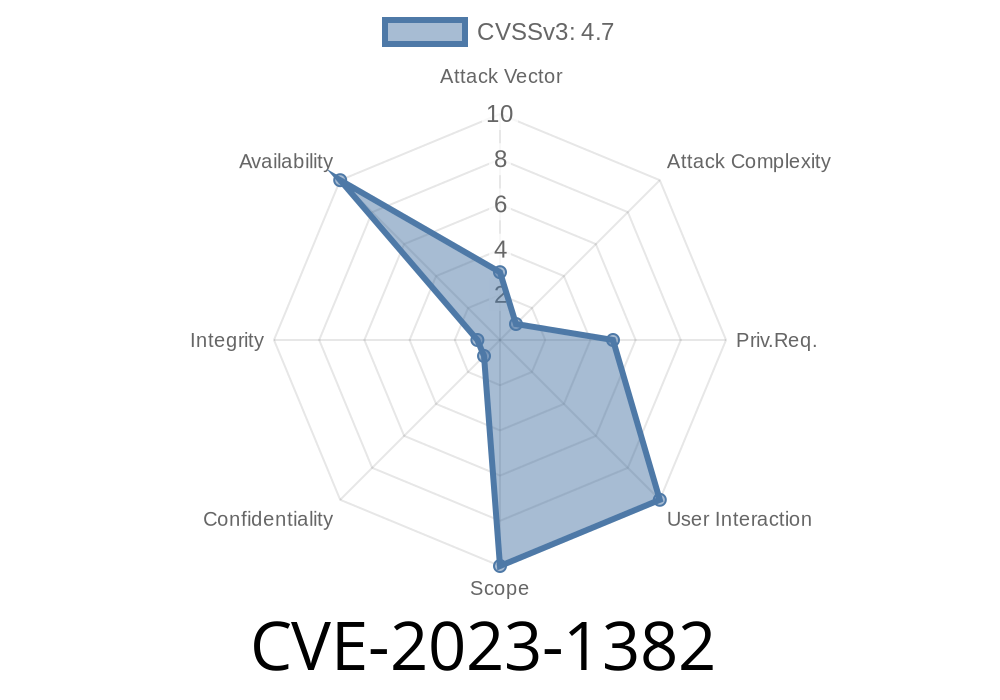Security vulnerabilities in the Linux kernel are always critical as they can impact millions of systems running across the globe. CVE-2023-1382 is a recently discovered data race issue in the Linux kernel TIPC (Transparent Inter-Process Communication) protocol implementation. This bug can potentially lead to a NULL pointer dereference, which can crash the kernel or be used for further exploitation under some circumstances.
This long-read aims to give you an exclusive and clear understanding of how this flaw happens, how it can be exploited, and what you can do to protect your systems.
What is TIPC?
TIPC (Transparent Inter-Process Communication) is a protocol for cluster communication inside the Linux kernel. It lets different applications running on different machines communicate as if they're on the same system.
Where's the Flaw?
The vulnerability resides in the topsrv.c file of the Linux kernel source, inside the TIPC protocol implementation.
A data race occurs between the point where the con (connection object) is assigned memory and when its sock pointer field (con->sock) is set. In between those steps, another CPU or thread could access con->sock, expecting it to be initialized, but it might still be NULL.
When the code later tries to access con->sock->sk, it can cause a NULL pointer dereference—often leading to a kernel crash (panic) or making it possible to control the execution flow under special conditions.
A Quick Look at the Vulnerable Code
// net/tipc/topsrv.c (simplified snippet)
static int some_function(...) {
struct tipc_topsrv_conn *con;
con = kzalloc(sizeof(*con), GFP_KERNEL);
// No lock here! Another thread could see 'con' half-initialized
...
con->sock = sock_alloc();
...
some_other_function(con->sock->sk); // <-- Potential NULL dereference!
}
How Could it Be Exploited?
An attacker with the ability to trigger TIPC connections (local or remote, depending on system configuration) may be able to:
Cause a kernel crash (Denial of Service)
- Manipulate kernel memory layout to attempt privilege escalation (theoretically, but hard in practice)
Suppose a program does the following
1. Spawn Two Threads/Processes: Both are creating or handling TIPC connections at the same time.
2. Race Condition Triggers: One of them allocates con and before con->sock is set, the other thread accesses or closes the connection.
NULL Dereference: First access to con->sock->sk crashes the kernel.
This situation is hard to time just right, but it's very real—especially on heavy, multi-CPU systems with lots of cluster traffic.
Below is a simplified pseudo code demonstrating the problem locally
// Thread 1: Connection Allocator
void* create_tipc_conn(void* arg) {
struct tipc_topsrv_conn *con;
con = kzalloc(sizeof(*con), GFP_KERNEL);
// Simulate delay before setting sock
sleep(1);
con->sock = sock_alloc();
return NULL;
}
// Thread 2: Premature Accessor
void* access_tipc_conn(void* arg) {
struct tipc_topsrv_conn *con = (struct tipc_topsrv_conn*)arg;
if (con->sock) {
struct sock* sk = con->sock->sk;
// use sk...
} else {
// con->sock is NULL!
// Kernel might crash on dereference here
}
return NULL;
}
In the real kernel, these calls are much more indirect and triggered by network events, but the idea is the same.
Solution Implemented
In Linux commit b73b6a57e818834d22a581fe2b8e7caddf2cf09e (and mainline bug report), kernel maintainers addressed the issue by making sure that:
Patched Code Example
// Proper initialization and locking
mutex_lock(&con->lock);
con->sock = sock_alloc();
mutex_unlock(&con->lock);
All access should also verify that con->sock is valid.
Immediate action: Update your Linux system to a version with a fixed kernel
- For Ubuntu, check current security notices
- For RedHat/Fedora, see RedHat bug tracker
- Upstream Linux commit
If your system does NOT use TIPC (most desktops/servers do not), disable the protocol
# As root (may require different steps by distro)
modprobe -r tipc
echo "blacklist tipc" >> /etc/modprobe.d/disable-tipc.conf
Affected Versions
The bug is present in Linux kernels before 6.1.17 (mainline). Many distributions have backported the fix to earlier supported kernels. Always check with your vendor's security advisories.
References
1. CVE-2023-1382 on NVD
2. RedHat Bugzilla #2172054
3. Upstream Linux commit
4. Ubuntu Security Tracker
5. TIPC protocol overview
Conclusion
CVE-2023-1382 is a classic example of how even small synchronization bugs in kernel code can have large security consequences. All users of Linux kernel with TIPC enabled are strongly advised to patch their systems or disable the protocol if not in use. Keeping your systems up-to-date and minimizing attack surfaces is your best defense against such threats.
If you found this deep dive helpful, feel free to share or bookmark it for future reference! Stay secure.
Timeline
Published on: 04/19/2023 23:15:00 UTC
Last modified on: 04/28/2023 03:49:00 UTC
